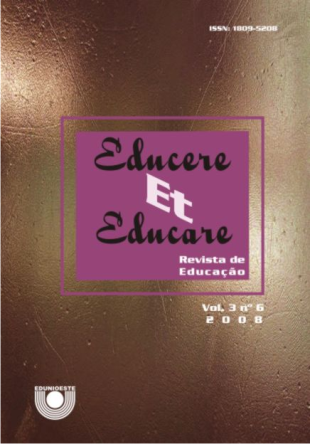DIVERSIDADE CULTURAL: UM ASSUNTO EMERGENTE
DOI:
https://doi.org/10.17648/educare.v3i6.1718Palavras-chave:
Organizações Multilaterais, Educação para a diversidade, Brasil, Política Educacional.Resumo
Este trabalho tem por objetivo analisar como está organizada a educação de uma forma geral no país no que tange sua relação com a proposta para se educar para a diversidade. As considerações acerca dessa realidade foram obtidas na análise do contexto social no qual o país está inserido e bem como na interação deste com a realidade das políticas internacionais, ao observar sua influência para delinear as políticas para a educação. Considerou-se o ideário neoliberal como o cenário político e econômico em que tais relações se desenvolveram. Observou-se como este ideário relacionado com as agências multilaterais tem interferido nas políticas nacionais, isto ao se analisar os documentos oficiais para assim, compreender, como a diversidade cultural é abordada nacionalmente. Concluí-se que é eminente e necessária assegurar o respeito à diversidade cultural, mas que, no entanto, a forma como essa preocupação é transposta não condiz com a realidade e com a necessidade da educação brasileira e, que o ideário neoliberal e as organizações multilaterais influenciam, diretamente, na formulação de tais políticas. As políticas para a diversidade são apenas destinadas a grupos específicos tornando-se, em sua maioria, políticas focalizadas. Deveriam-se considerar propostas de políticas para a diversidade que não fossem focalizadas como as existentes e que a discussão das mesmas pudessem partir do interior dos grupos sociais e das escolas, locais em que os atores sociais envolvidos reproduzem as relações sociais estabelecendo-se, assim, uma relação democrática, no que tange à investigação, formulação e aplicação de tais políticas.Downloads
Publicado
16-04-2009
Como Citar
DE ARAÚJO, V. F. DIVERSIDADE CULTURAL: UM ASSUNTO EMERGENTE. Educere et Educare, [S. l.], v. 3, n. 6, p. p. 153–163, 2009. DOI: 10.17648/educare.v3i6.1718. Disponível em: https://saber.unioeste.br/index.php/educereeteducare/article/view/1718. Acesso em: 20 dez. 2025.
Edição
Seção
DOSSIÊ: ENSINO, FORMAÇÃO DE PROFESSORES E EDUCAÇÃO BÁSICA: PERSPECTIVAS INTERDISCIPLINARES
Licença
Aviso de Direito Autoral Creative Commons
Política para Periódicos de Acesso Livre
Autores que publicam nesta revista concordam com os seguintes termos:
1. Autores mantém os direitos autorais e concedem à revista o direito de primeira publicação, com o trabalho simultaneamente licenciado sob a Licença Creative Commons Attribution que permite o compartilhamento do trabalho com reconhecimento da autoria e publicação inicial nesta revista.2. Autores têm autorização para assumir contratos adicionais separadamente, para distribuição não-exclusiva da versão do trabalho publicada nesta revista (ex.: publicar em repositório institucional ou como capítulo de livro), com reconhecimento de autoria e publicação inicial nesta revista.
3. Autores têm permissão e são estimulados a publicar e distribuir seu trabalho online (ex.: em repositórios institucionais ou na sua página pessoal) a qualquer ponto antes ou durante o processo editorial, já que isso pode gerar alterações produtivas, bem como aumentar o impacto e a citação do trabalho publicado (Veja O Efeito do Acesso Livre).
Licença Creative Commons
Esta obra está licenciada com uma Licença Creative Commons Atribuição-NãoComercial-CompartilhaIgual 4.0 Internacional, o que permite compartilhar, copiar, distribuir, exibir, reproduzir, a totalidade ou partes desde que não tenha objetivo comercial e sejam citados os autores e a fonte.


